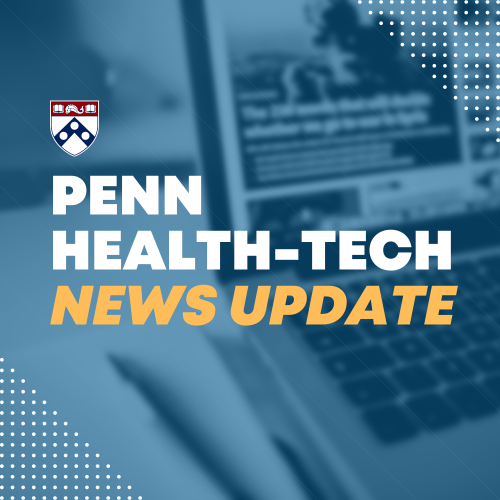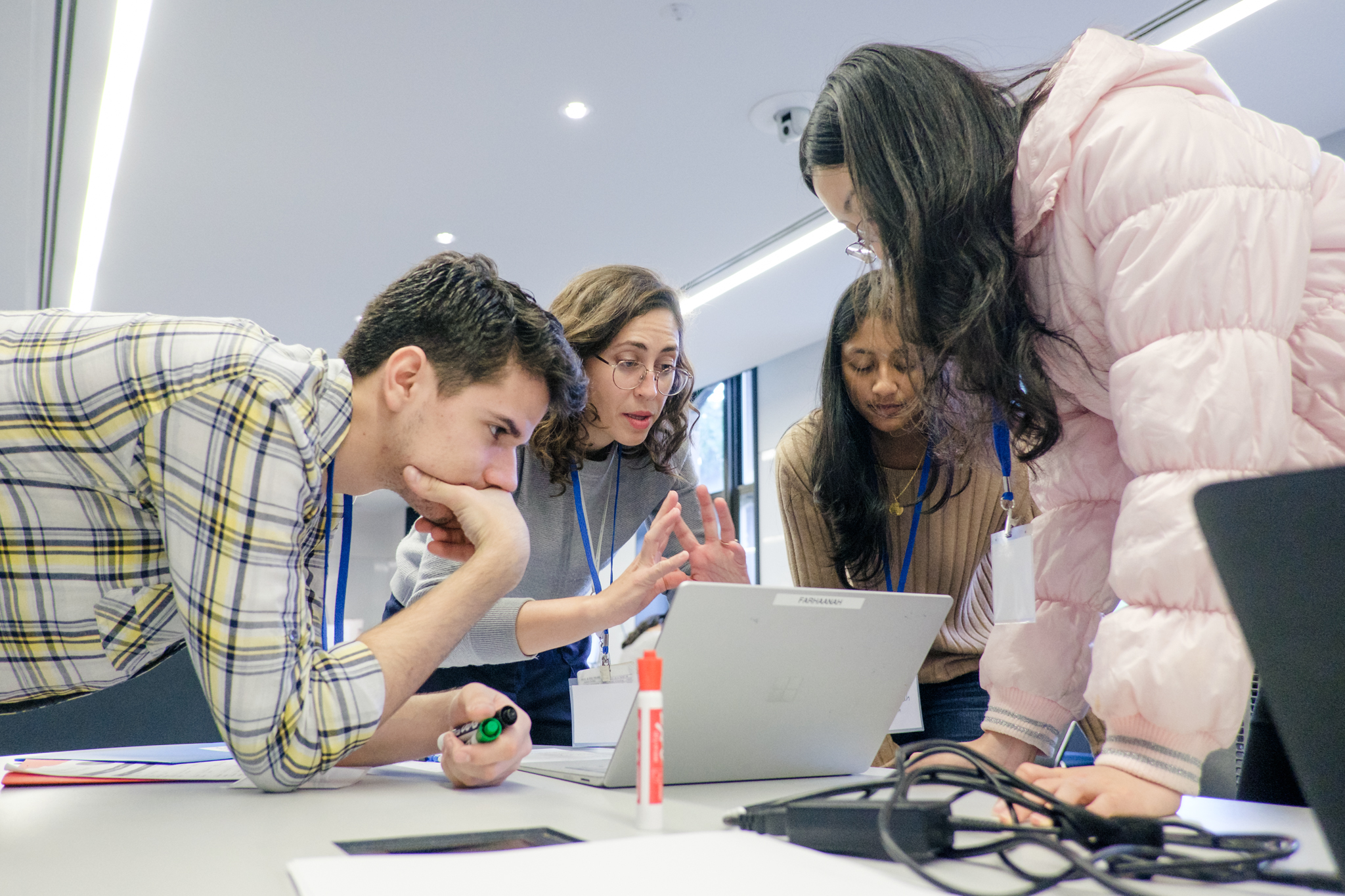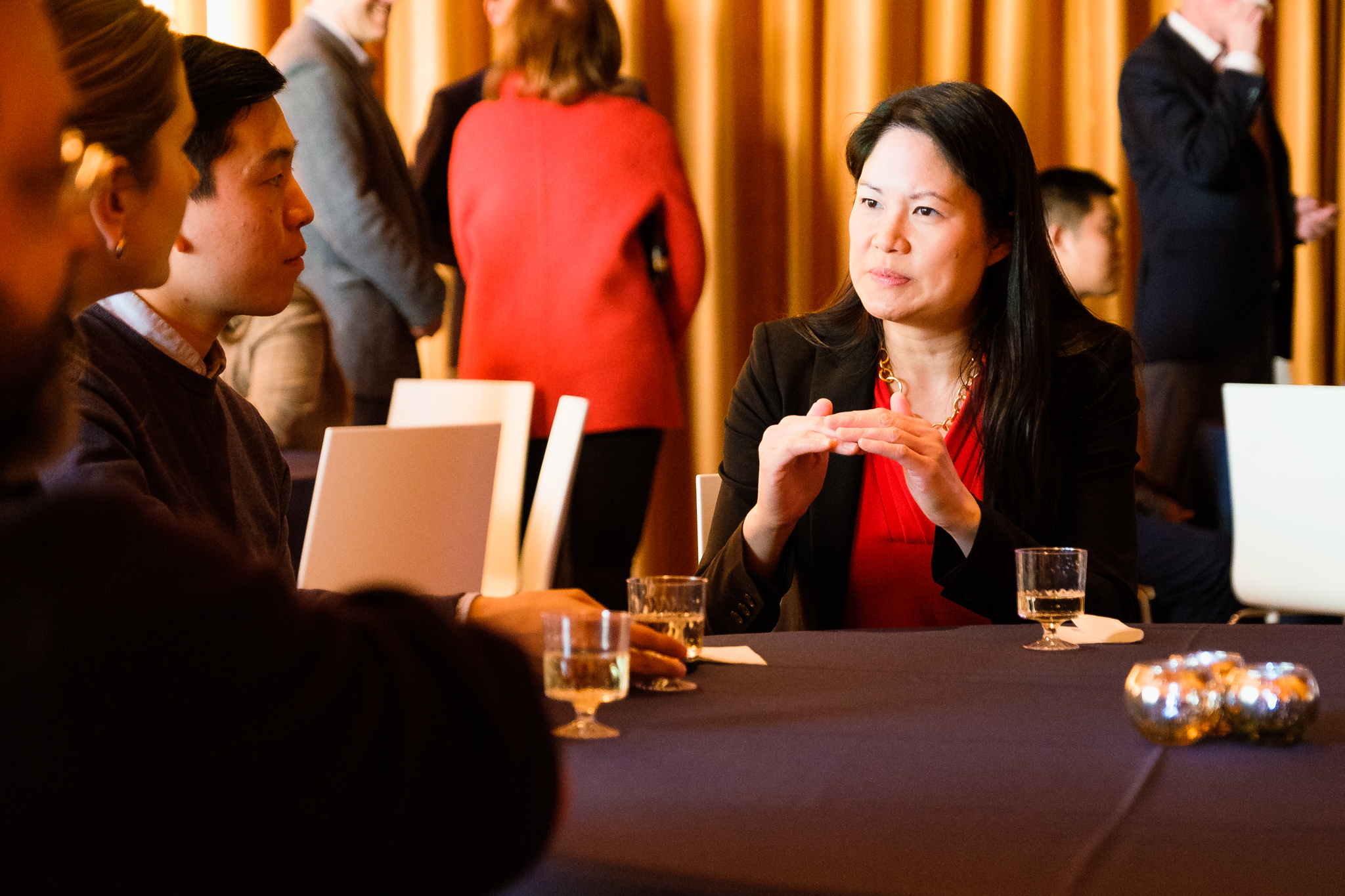News ItemBack to News

Watch this Space: Penn Health-Tech Drives Innovation
It’s been a busy fall for Penn Health-Tech. This year’s cohort for the Accelerator program was selected in July, from a competitive pool of 83 submissions. Now, 11 teams are hard at work on their projects, from the early postpartum hemorrhage detection of Vasowatch, to a “smart” feeding tube, which helps clinicians avoid life-threatening airway complications.
In addition to the Accelerator program, multiple Penn Health-Tech events this semester have brought together the innovation community. Faculty from Penn Engineering, Penn Medicine, the Penn Center for Innovation, and other Penn groups discussed practical topics such as patenting strategies and how to set up opportunities for innovators to test a product with potential customers. Penn Health-Tech’s new Executive Director, Dr. Katie Reuther, led a seminar on one of her many areas of expertise: commercializing med-tech devices.
Since her arrival at Penn Health-Tech in late July, Dr. Reuther has been on a listening tour and has enjoyed learning about the important work being done in the innovation space at Penn. In addition to meeting with innovation leaders, scientists, and researchers at Penn, Dr. Reuther said she’s also enjoyed getting to know alumni of Penn Health-Tech’s Accelerator program. “It’s wonderful to hear how Penn Health-Tech has been instrumental in the development of their projects and has helped them to achieve the success they’re experiencing today,” Dr. Reuther said.
A Return to Penn, Continuing Innovation Leadership
Dr. Reuther took up her leadership role at Penn Health-Tech just a few months ago, but she is not new to Penn. Dr. Reuther obtained her Ph.D. in Bioengineering here, working in the lab of Dr. Louis Soslowsky and collaborating with orthopedic surgeons, studying important clinical questions about the mechanism of soft tissue injury and repair in the shoulder, among other research topics. Dr. Reuther also brings considerable business training and experience to her role at Penn Health-Tech, having obtained her MBA at Columbia, having co-founded a medical device start-up, and having coached innovators at all levels in bringing their health technology ideas to fruition.
“It’s wonderful to hear how Penn Health-Tech has been instrumental in the development of their projects and has helped them to achieve the success they’re experiencing today.”
“She has a background in business so that she can look at this not only scientifically but from a business perspective, and she knows Penn—she trained here. So she really hit the ground running,” said Dr. Brian Litt, Faculty Director and cofounder of Penn Health-Tech.
Most recently at Columbia University, Dr. Reuther co-created and then led Columbia’s renowned Biomedical Engineering Technology Accelerator (BiomedX). During her tenure as director, Dr. Reuther oversaw more than 60 different health care technologies which led to $80 million in follow-on funding and 18 licenses to startups or established companies.
“That experience over the past seven years at Columbia really led me down this path and towards a direction and a passion for finding how we can best support translational research, and the development of new technologies from the lab to the market, and from bench to bedside, to ultimately impact human health and also benefit society,” said Dr. Reuther.
Dr. Reuther is also passionate about teaching and values the opportunity to help train the next generation of innovators. “I come from a family of educators, and I really enjoy supporting and educating future innovators,” Dr. Reuther said. “What I’m bringing to the table is how to think about how their technology can potentially move outside of the lab to impact patients, by providing frameworks and tools to validate the problem being solved and the commercial opportunity for their solution.”
Glory Durham, Penn Health-Tech’s Director of Operations, is thrilled to have Dr. Reuther join the center, and pointed to Dr. Reuther’s strong commitment to teaching and mentorship, among other qualities. “One of her greatest strengths is to make every situation into a teachable moment,” Durham said. Last spring, Dr. Reuther was awarded Columbia’s highest teaching honor in recognition of her exceptional teaching and mentorship of students.

Alexandra Marquez, MD, Faculty at Children's Hospital of Philadelphia,
mentoring students during the Fall 2018 Catalyzer at Penn
As Dr. Litt said of Dr. Reuther, “She’s good from the nuts and bolts all the way up to talking to CEOs of corporations, and those people are rare.”
Areas of Growth in Health Technology and Medical Devices
For engineers, clinicians, scientists, and others working in the health care technology space, the COVID-19 pandemic has in many ways shifted the focus of innovation. Point-of-care devices that can monitor and test patients at home, giving real-time feedback to clinicians, have proven to be extremely useful, especially when patients were told to stay away from ERs and doctor’s offices for all but life-threatening emergencies. Similarly, telehealth has expanded dramatically during the pandemic and will continue to be a useful tool for improving access to medical care.
Another major area of growth in health technology innovation is in data management and analysis. As Durham explained, “Health Informatics is growing exponentially and data science is a huge part of what health care now means. So how do we use health care data, how do we ensure privacy of that data, who gets to use data? Does it add bias?” These are the questions innovators should be asking.
The current cohort of Accelerator teams reflects these important areas of health technology growth, from the low-cost novel mechanical ALFA Ventilator to a low-cost rapid COVID-19 test developed by Dr. Cesar De La Fuente, who won the inaugural NEMO prize for this simple device with a tremendous potential impact.
Penn Health-Tech Going Forward: Education, Community Building, and a Focus on Impact
“I really respect and admire what they have done because it’s clear to me that it’s a good program, and that’s why I’m excited to be here to lead it to the next stage of growth.”
Penn Health-Tech’s leadership is excited to see the center expand its reach as it continues to grow. One area of expansion is through education. Though typically more faculty-focused in its programming, PHT now has an Executive Director who is piloting two courses centered around medical device development and commercialization through the Bioengineering Department of Penn Engineering. “Having Dr. Reuther not only overseeing PHT’s Accelerator teams, but also directly instructing Penn students will help PHT continue to expand its reach and impact in the Penn community and foster the next generation of innovators,” said Sarah Gilmour, Assistant Director of Development for Biomedical Research. Gilmour has been instrumental in bringing in crucial funding for the center.
Glory Durham has also been an important advocate for educating and training young innovators at Penn. “We want to challenge people to be the next generation’s innovators and change-makers. So what does it look like to sustainably incorporate students, particularly master’s level students?” she said. “The directive becomes: let’s change healthcare, let’s transform health care with useful devices and technologies.”
Another area of expansion is through community building—something that Penn Health-Tech has already become known for. As she hears from alumni of the Accelerator program, Dr. Reuther has learned that “funding is important, but what’s most important are the resources and connections,” that innovators gain during their time in the program. “Innovation is a team sport, but it can be lonely as well, so we try to help facilitate a community of innovators so that they learn from one another and share resources,” Dr. Reuther added.

Vatinee Bunya, MD, Ophthalmology faculty at the
Penn Health-Tech 2019 Call for Proposals Awardee Reception
Taking a step back for the big picture view, Penn Health-tech leaders want Penn, and the whole Philadelphia region, to become a hub for med tech and devices. As Dr. Litt explained, Philadelphia “is already a hub for cellular therapies, but we really want to make it a national device hub.” Many Penn students end up working at Verily, at Medtronic, at Boston Scientific and other health tech companies—Penn Health-Tech would like them to be able to stay and work in Philadelphia.
Dr. Reuther also emphasizes the responsibility that universities have in developing innovative health care technologies to meet the needs of today and benefit society. “A big reason I’m involved in this is because I have this passion towards driving these academic projects from idea to impact, and some of the reason behind that is, the NIH invests over a billion dollars towards fundamental research and discovery at universities with the goal of applying that knowledge to impact human health,” Dr. Reuther explained. She wants to be sure those dollars are put to good use at Penn, by ensuring that promising health tech innovators get the funding they need as well as practical training, advice, and community support as they navigate the challenging terrain of health tech innovation.
Four years after Penn Health-Tech’s launch, the center continues to demonstrate the importance of connecting innovators from across the university and Penn Medicine, providing a significant portion of more than $1.5 million in funding to over 45 project teams and early-stage start-ups, as well as expert guidance and a community of peers to spur health technology innovation.
Kick-started with a generous gift from Jonathan A. Brassington, GEN'97 WF'08, and Linda M. Brassington, Penn Health-Tech continues to garner attention and attract donors. “It has been inspiring to witness firsthand how investments in PHT have helped the University build bridges across disciplines and advance discovery at a more rapid pace: from the amazing Rothberg Catalyzer—a two-month program that introduces Penn students to healthcare innovation and entrepreneurship culminating in an immersive two-day “makerthon”…to the NEMO Prize that targets support to early-stage ideas at the intersection of engineering and medicine that have the potential to rapidly impact human health, but do not yet qualify for federal support or private investment,” said Gilmour.
Dr. Reuther is struck by the strong foundation that has been put in place by the founders, leaders, and funders of Penn Health-Tech for the past four years. “I really respect and admire what they have done because it’s clear to me that it’s a good program, and that’s why I’m excited to be here to lead it to the next stage of growth.”